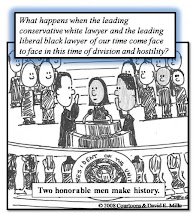
Long time defense attorney David Smith shared this piece off AOL last nite, which should be required reading for any prospective juror on a criminal prosecution.
Calling it "the saddest case" he'd ever seen, a judge exonerated late inmate Timothy Cole, pictured here to the right, who was convicted of rape in 1985. DNA evidence helped clear Cole -- and pointed to Jerry Wayne Johnson instead. This was the first case in Texas history where DNA cleared someone who had died in prison, said the Innocence Project, handling the matter.
But why the man died in prison opens up a whole new story. He refused to ever admit to the crime or take a plea. He stood his ground and maintained his innocence.
Cole was convicted of raping a Texas Tech University student in Lubbock in 1985 and was sentenced to 25 years in prison. He died in 1999 at age 39 from asthma complications.
DNA tests in 2008 cleared him posthumously. Johnson testified in court Friday that he was the rapist in Cole's case and asked the victim and Cole's family to forgive him.
DNA tests in 2008 cleared him posthumously. Johnson testified in court Friday that he was the rapist in Cole's case and asked the victim and Cole's family to forgive him.
"I'm responsible for all this. I'm truly sorry for my pathetic behavior and selfishness. I hope and pray you will forgive me," Johnson said.
Cole had refused to plead guilty before trial in exchange for probation, and while in prison, he refused to admit to the crime when it could have earned him release on parole.
Cole's family now wants Gov. Rick Perry to issue a formal pardon.
Cole's family now wants Gov. Rick Perry to issue a formal pardon.
As David Smith noted, "No we do not want guilty persons going free. Nor do we want innocent people being found guilty." Jurors should be reminded that mistakes are made, mistakes are indeed made. Ask the Cole family. Read the compelling three part story from Lubbock online below.
see also this story from the NPR
































This case illustrates how our criminal justice system punishes the innocent more harshly than the guilty. This phenomenon occurs because of several rules and practices:
ReplyDelete1. The federal sentencing guidelines and sentencing guidelines in many states provide for reductions in sentences for "acceptance of responsibility." The innocent defendant, who refuses to admit to the crime, will not receive this benefit.
2. An innocent defendant might often refuse to accept a guilty plea deal. When the innocent defendant defends his or her innocence at trial and gets wrongly convicted, that defendant will invariably receive a much higher punishment than that proposed in the plea deal.
3. An innocent defendant, by not admitting to the crime, might hurt his or her chance for an early release from prison.
These factors lead to the rather perverse outcome that defendants who are innocent are punished more harshly than the guilty. The innocent defendant faces a terrible choice -- either falsely admit guilt, in exchange for a lighter punishment, or defend his or her innocence but pay dearly if he or she loses. Innocent defendants are probably much more likely to choose the latter strategy. Timothy Cole turned down a plea deal for probation because he didn't want to confess to a crime he didn't commit. That's a decision made on principle, one that an innocent person might very well make but rather unusual for a guilty person to make.
- Daniel Solove in Concurring Opinions